|
|
|
Sort Order |
|
|
|
Items / Page
|
|
|
|
|
|
|
| Srl | Item |
| 1 |
ID:
116224
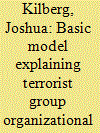

|
|
|
|
|
| Publication |
2012.
|
| Summary/Abstract |
Terrorist groups strive to balance efficiency with their need for security. This article examines the factors that affect a group's choice of organizational structure. I classify 254 groups from the Global Terrorism Database into one of four basic structures: market, all-channel, hub-spoke, or bureaucracy. The results of a multinomial logistic regression reveal that as secret organizations, terrorist groups are not just driven by achieving efficiencies in their organization but rather by protecting against infiltration and threats. Internal factors such as target selection, operational pace, ideology, and stated goals shape a group's structure. External environmental factors such as political rights, civil liberties, polity durability, and state wealth also help shape a group's structure.
|
|
|
|
|
|
|
|
|
|
|
|
|
|
|
|
| 2 |
ID:
152874
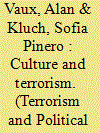

|
|
|
|
|
| Summary/Abstract |
The relationship between terrorism and culture was systematically examined using three high-quality global databases. Contrary to prior research, terrorism—collapsed across form and era—was not related to any of Hofstede's cultural dimensions. Yet, particular forms of terrorism—incidents involving substantial casualties and damage, suicide bombings, and the proportion of incidents involving fatalities—all showed relationships with cultural dimensions. Tolerance of terrorism and relative tolerance of the 9/11 attack were related to cultural dimensions and terrorist events. Finally, populations that were relatively voiceless, disengaged from their communities, suffering, angry, and hopeless showed more tolerance of terrorism and incidents of terrorism.
|
|
|
|
|
|
|
|
|
|
|
|
|
|
|
|
| 3 |
ID:
183907


|
|
|
|
|
| Summary/Abstract |
Definitional assumptions within and across terrorism databases cause variations in terrorist incidents that can have impactful implications for time-series analyses. This study compares 2002–2016 Western Europe attacks recorded by the open source media Global Terrorism Database (GTD) and US governmental reports, Country Reports on Terrorism (formerly Patterns of Global Terrorism). The findings indicate significant differences exist between the GTD and US governmental reports related to location, type, perpetrators, and target of attacks.
|
|
|
|
|
|
|
|
|
|
|
|
|
|
|
|
| 4 |
ID:
173243


|
|
|
|
|
| Summary/Abstract |
This article attempts to fill a gap in research on terrorism in the Visegrad Group member states. Its major objective is to discover and understand whether terrorism truly is a serious threat to V4 members. To reach this goal, quantitative and qualitative content analysis is used. The conducted analysis has demonstrated that V4 member states hardly report any arrests or convictions of individuals accused of terrorist activities. The threat of terrorism exists. However, it is definitely less imminent than in the United States or Western European countries. The data indicate that Visegrad members deal with the challenge of non-Islamist terrorism. In Central Europe, left-wing militancy is almost non-existent, and right-wing extremism, though evidently present in the region, is not a major threat in the context of terrorism.
|
|
|
|
|
|
|
|
|
|
|
|
|
|
|
|
| 5 |
ID:
077131
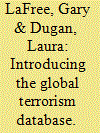

|
|
|
|
|
| Publication |
2007.
|
| Summary/Abstract |
Compared to most types of criminal violence, terrorism poses special data collection challenges. In response, there has been growing interest in open source terrorist event data bases. One of the major problems with these data bases in the past is that they have been limited to international events - those involving a national or group of nationals from one country attacking targets physically located in another country. Past research shows that domestic incidents greatly outnumber international incidents. In this paper we describe a previously unavailable open source data base that includes some 70,000 domestic and international incidents since 1970. We began the Global Terrorism Database (GTD) by computerizing data originally collected by the Pinkerton Global Intelligence Service (PGIS). Following computerization, our research team has been working for the past two years to validate and extend the data to real time. In this paper, we describe our data collection efforts, the strengths and weaknesses of open source data in general and the GTD in particular, and provide descriptive statistics on the contents of this new resource
|
|
|
|
|
|
|
|
|
|
|
|
|
|
|
|
| 6 |
ID:
147592
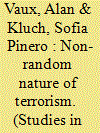

|
|
|
|
|
| Summary/Abstract |
We examined the geographic concentration and persistence of terrorism using the Global Terrorism Database (GTD). The GTD logs all terrorist incidents worldwide using open-source media, and, for 1970–2013, includes over 125,000 incidents from over 200 countries and territories. We examined regional and country-level data; different terrorism forms, severity levels, and timeframes (entire period, five-year periods, and annual); and multiple definitions of “elevated” terrorism. The findings reveal that terrorism is concentrated geographically and temporally. Most countries experience peace or very low levels of terrorism; only a few experience substantial outbreaks; very few experience prolonged terrorism; and even fewer, prolonged severe terrorism.
|
|
|
|
|
|
|
|
|
|
|
|
|
|
|
|
| 7 |
ID:
102506


|
|
|
|
|
| Publication |
2011.
|
| Summary/Abstract |
Democratic regimes have been linked to terrorism for contending reasons, with some scholars claiming democracy increases terrorism and others claiming it decreases terror. Corroborating evidence has been used for both relationships leading to the following puzzle: why do some democratic regimes seem to foster terrorism while others do not? We offer an explanation based on Tsbelis's veto players theory. Beginning with the assumption that terror groups want to change government policy, we argue that the more veto players present in a political system, the more likely the system is to experience deadlock. Given the inability of societal actors to change policies through nonviolent and institutional participation, these systems will tend to generate more terror events. We also explore different methods for estimating terrorism models. We identify several ways to match the data with the proper statistical estimator and discuss implications for terrorism research. Finally, we use new data from the Global Terrorism Database (GTD) that was previously unavailable. These data allow us to use different operational definitions of terrorism and to identify homegrown terror events.
|
|
|
|
|
|
|
|
|
|
|
|
|
|
|
|
| 8 |
ID:
156916
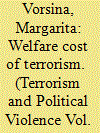

|
|
|
|
|
| Summary/Abstract |
Data from 117 countries over the period 2006 to 2011 are used to estimate a macroeconomic cross-country system of equations that examines the association between terrorism, self-reported life satisfaction, and national income. Results indicate that terrorism is negatively associated with life satisfaction, whereas no such association is found between terrorism and real GDP per worker. Stark contrasts are found, however, between OECD and non-OECD members. In all, our results suggest that the social costs of terrorism are potentially much higher than the economic costs, and measuring only the conventional economic costs of terrorism significantly underestimates the true costs.
|
|
|
|
|
|
|
|
|
|
|
|
|
|
|
|
| 9 |
ID:
152860


|
|
|
|
|
| Summary/Abstract |
Domestic terrorism accounts for a vast majority of all attacks, yet it is far less studied than its transnational counterpart. As a result, the literature on domestic terrorism remains theoretically and empirically underdeveloped. One of the reasons for this is the dearth of comprehensive crossnational domestic terrorism datasets. This article seeks to address the problem by proposing a method for refining original Global Terrorism Database (GTD) data into a constructively valid, crossnational domestic terrorism dataset. The analysis begins with the definition of terrorism and further develops it by conceptually distinguishing its domestic and transnational forms. Because the GTD includes nonterrorist events and conflates transnational and domestic incidents, its raw form is unsuited for domestic research. Therefore, the article examines common definitional attributes from terrorism and domestic terrorism literature. It concludes by specifying steps for assembling a dataset and examining descriptive statistics of the resulting population.
|
|
|
|
|
|
|
|
|
|
|
|
|
|
|
|
|
|
|
|
|